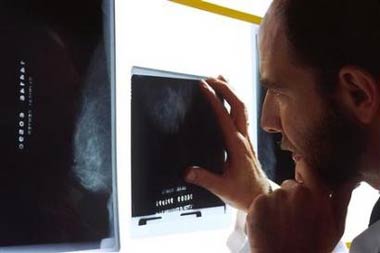Older women who take hormone pills that combine estrogen and testosterone
more than double their risk of breast cancer, according to a study of more than
70,000 nurses.

A doctor looks at an X-Ray showing breast
cancer cells in this undated file photo. Tamoxifen, the pill that prevents
breast cancer in high-risk women, does not appear in the long run to save
many lives, US researchers reported on Monday.
[Reuters] |
"This type of hormone therapy may
help with mood, libido and bone mineral density, but the possible risk of breast
cancer may outweigh these benefits," said study co-author Rulla Tamimi of
Harvard Medical School.
The findings, published in Monday's Archives of Internal Medicine, add to the
evidence that certain types of hormone supplements, such as estrogen-progestin
pills, increase women's risk of breast cancer, strokes and heart attacks.
Earlier research also found a greater breast cancer risk in women with higher
natural levels of testosterone.
The overall risk of breast cancer among the participants in the latest study
was small, with 17 cases of the disease among the 500 or so women who took the
estrogen-testosterone combination.
Women's natural levels of estrogen and testosterone decline with menopause.
Only about 2 percent of women taking hormones in the study in 2000 used a
form that included testosterone. But usage climbed during the 24 years of the
study as evidence appeared linking the hormone combination to better bone
density, improved mood and greater sexual enjoyment.
Estrogen-testosterone pills are sold under the brand names Estratest and
Estratest H.S. by Solvay Pharmaceuticals of Marietta, Ga. Those brand names
appear on a Washington-based advocacy group's "Worst Pills" list because of
breast cancer risk.
"We strongly urge women not to use this product or similar products from
compounding pharmacists," said Dr. Sidney Wolfe, director of Public Citizen's
Health Research Group, which produces the Worst Pills list.
The Food and Drug Administration has asked Solvay for evidence the drug eases
hot flashes in menopausal women, as the label claims. The company has requested
a hearing on the matter.
The drug was approved 30 years ago, before such evidence was required.
The new study used data from the long-running Nurses' Health Study. The women
who took estrogen and testosterone after menopause had a 2 1/2 times higher risk
of developing breast cancer than women who never took hormones. Most of the
women taking the combination used Estratest.
"The company has not yet had the opportunity to review the details of the
study or the content of the article," said Solvay spokesman Gabrielle Braswell.
The researchers took into account other breast cancer risk factors, such as
family history, weight and age at menopause and still found an increased risk
associated with estrogen-testosterone pills.